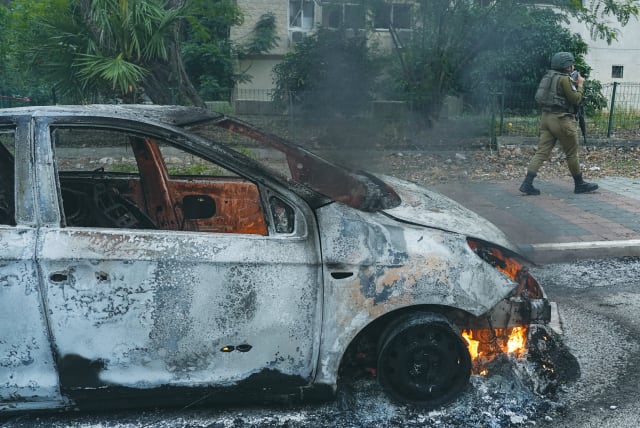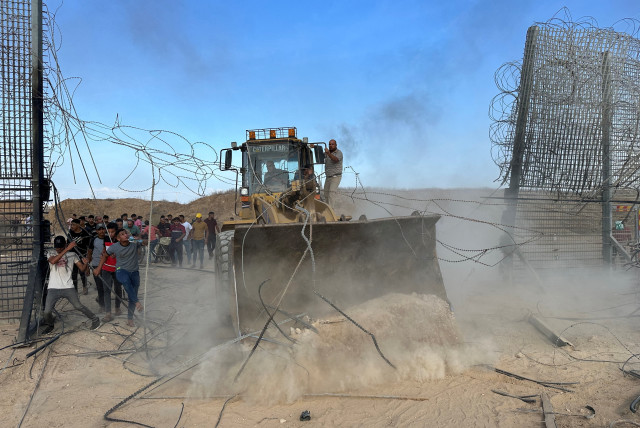What mainstream media isn’t reporting during the Israel-Hamas war - opinion

With very little information getting out there about what’s really happening in Israel, both Jews and non-Jews in the Diaspora must arm themselves with accurate, evidence-based information.
If you’re reading this outside of Israel on jpost.com, chances are, I’m preaching to the converted as it means you get your news about what’s going on here from a reliable Israeli news source – The Jerusalem Post.
However, those who have just stumbled across this article, whose main information concerning the situation here is the mainstream media (MSM), will probably be surprised by what they’re about to read. In short, MSM will only tell you half a story, and a biased one at that.
Diaspora dwellers could be forgiven for thinking that the war in Israel is centered around Gaza alone: “Nothing about the North of Israel on any news in [the] UK. The only news at the moment is about getting food into Rafah,” said Chana Werner of Bolton, UK.
Using Israeli news outlets for information about the war
Those who live stateside share the same problem, as Sandy Wasserman confirmed, “I have to seek [Israeli news] out online. Then I read it from various sources. But it’s not reported in the standard US TV news. All we hear about is Trump’s trial.”
As we all know, or at least ought to know, on October 7, Hamas and their supporters flooded into Israel from Gaza, hellbent on death and destruction. These merciless terrorists crossed the border into Israel by air, land, and sea, brutally attacking anyone they came across in the towns and villages along the border, regardless of their age or gender.
Over 1,200 people were slaughtered in the most violent and inhuman ways possible, often after being raped and tortured in the process. Further, over 250 people, from tiny children to elderly Holocaust survivors, were kidnapped into Gaza where around 130 remain, alive or dead, some of whom are known to have been murdered there.
Naturally, an Israeli ground invasion into Gaza followed this horrific massacre, which has been the subject of much heated debate. While the operation was still in the planning stage, before a single soldier had even set foot on Gazan soil, absurdly, some were calling for a ceasefire.
Since then, the world has watched as the war has been prosecuted in the Strip, poring over every military decision, largely trying to paint Israel and the IDF as the aggressor, and regarding as victims Hamas, its supporters, and the people of Gaza – often unable to distinguish between them.
“In general, from watching MSM, we have the impression that the IDF is killing innocent children, unopposed, and there is no mention of the ongoing rocket attacks on Israel apart from the Iranian attack which was portrayed as a harmless gesture,” explained Paul Martin Gurnett from Britain.
The innocent victims of October 7, however, hardly get a mention anymore. And when they do, it’s perfunctory at best.
Recently, for example, well-known English sports broadcaster Gary Lineker referred to the October 7 attack simply as “the Hamas thing.” Like many, he’s been extremely vocal about the plight of the Gazans, and yet he’s barely commented on the atrocity itself, save to minimize it.
WHAT MANY outside of Israel may not realize, however, is that the war has affected not only those who live in the Gaza border communities – many of whom have been displaced or even lost their homes – but it also affects residents in the North just as badly.
Since the conflict began, northern Israel has come under repeated rocket and drone attacks from both Hamas and Hezbollah terrorist groups stationed in Lebanon.
While such attacks from Gaza have lessened as Hamas’s capabilities have been weakened, no such let-up has been apparent in the North. In fact, it’s getting worse.
Currently, over 60,000 people are still displaced from their homes in the border towns and cities of northern Israel, with some completely out of bounds – entry is with IDF permission only.
Many who fled their homes on October 7 left with little more than the clothes on their backs and haven’t been able to return since. Pleas to retrieve precious mementos from their homes, such as photos, in case they should be destroyed in one of the ongoing attacks, have been refused, so dangerous is the situation up there.
A “war zone,” is how Alex Haruni,, owner of Dalton Winery, located 10 km. from the Lebanon border describes the whole area.
“Is a rocket going to land on us?” He often wonders to himself, he told me in a recent interview.
Like many business owners in the area, Hurani is unsure about what the future holds: “I always prepare the winery as if we’re not coming back tomorrow.”
And his fears are well-placed. Last week, for example, around 75 rockets were fired from Lebanon into Israel in a single day - and that’s not unusual. Although many were intercepted, the damage, chaos, and fear caused by such frequent barrages are substantial.
ANOTHER ONGOING tragedy about which many outside Israel are unaware is the deaths of soldiers on the frontlines both in Gaza, the North, and the West Bank.
Men, some as young as 19, as well as reservists in their 20s, 30s, and even 40s, are making the ultimate sacrifice to keep us safe, often leaving behind young children who will grow up without a father.
Many more troops have suffered serious, life-changing injuries, including the loss of limbs.
“The impact on Israeli society moving forward in terms of rehabilitation and handicapped people living among us is going to be a tremendous shock for most people,” says, Dr Shlomi Codish, director general at Soroka Medical Center, “and that’s before we even talk about mental health.”
This ongoing, heartbreaking situation is one that all of us here have had to live with for eight months. Obviously, for the thousands who do not know when they will be able to return home – “refugees” in their own land – life is much tougher. And then there’s the unbearable anguish of the hostages and their families, as well as those who are mourning the deaths of loved ones.
The suffering of the nation as a whole runs deep and affects every aspect of our lives.
AND YET, apart from news of the ongoing war in Gaza, with the focus mainly on the plight of the Palestinians and how to get aid to them, very little of this tiny nation’s ongoing ordeal is known by the outside world.
To keep up to date with what’s happening on the ground in Israel, many have turned away from the MSM altogether, instead get their information from English-language Israeli news outlets and television channels, as well as other online sources, such as the IDF Facebook page and WhatsApp groups.
With very little information getting out there about what’s really happening in Israel, both Jews and non-Jews in the Diaspora must arm themselves with accurate, evidence-based information.
Anything less would be a disservice to the people of Israel whose ongoing plight must not be minimized or ignored.
The writer is a former lawyer from the UK who now lives and works in Israel as a freelance writer for The Jerusalem Post.
Jerusalem Post Store
`; document.getElementById("linkPremium").innerHTML = cont; var divWithLink = document.getElementById("premium-link"); if (divWithLink !== null && divWithLink !== 'undefined') { divWithLink.style.border = "solid 1px #cb0f3e"; divWithLink.style.textAlign = "center"; divWithLink.style.marginBottom = "15px"; divWithLink.style.marginTop = "15px"; divWithLink.style.width = "100%"; divWithLink.style.backgroundColor = "#122952"; divWithLink.style.color = "#ffffff"; divWithLink.style.lineHeight = "1.5"; } } (function (v, i) { });

